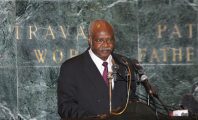Privacy Overview
This website uses cookies so that we can provide you with the best user experience possible. Cookie information is stored in your browser and performs functions such as recognising you when you return to our website and helping our team to understand which sections of the website you find most interesting and useful.


















8, September 2019
US: Trump claims cancelling peace talks in US with Taliban leaders over attacks 0
US President Donald Trump has claimed canceling peace talks with leaders of Afghanistan’s Taliban insurgents in a resort near Washington after the notorious militant group claimed responsibility for a recent Kabul attack that killed an American soldier and 11 others.
Trump revealed in a Twitter post on Saturday that he had planned a secret meeting with Taliban’s “major leaders” on Sunday at a presidential resort compound in Camp David, Maryland, adding that he also planned a meeting with his Afghan counterpart Ashraf Ghani, who was left out of the US talks with the militant group that seeks to topple the Kabul government.
The US president further stated that he immediately called off the talks after the insurgents declared responsibility for the attack on the Afghan capital.
“If they cannot agree to a ceasefire during these very important peace talks, and would even kill 12 innocent people, then they probably don’t have the power to negotiate a meaningful agreement anyway,” Trump wrote in the Twitter message.
Trump’s announcement came hours after US Defense Secretary Mark Esper said Washington is seeking a “good deal” with the Taliban even after a wave of recent attacks by Afghan insurgents overshadowed negotiations with the militant group.
“The United States’ view is that the best way forward is a political agreement and that (is what) we’re working diligently on right now, that doesn’t mean we’ll take any deal,” Esper said on Saturday during a press conference in Paris with his French counterpart.
“We will make sure we have a good deal, a good enough deal that guarantees at least the security of our countries going forward and a brighter path ahead for the Afghan people,” he stated.
The Taliban insurgents — who now control more Afghan territory than at any time since the US-led military invasion of the country in 2001 aimed at rooting out Taliban and terrorism across Afghanistan — launched new offensives against the northern cities of Kunduz and Pul-e Khumri over the past week and carried out two major terror bombings in the capital Kabul.
In one of the Kabul blasts on Thursday, a bomber set off his explosives near the American Embassy, killing a US Army Sergeant 1st Class Elis Barreto Ortiz of Puerto Rico, bringing the number of American forces killed in Afghanistan this year to 16.
The development came as a senior US military commander stated during a visit to Pakistan that the surge of attacks by Taliban insurgents in neighboring Afghanistan has been “particularly unhelpful” to what he described as “peace efforts” there.
Surge of Taliban attacks hindering peace talks: CENTCOM
“It is particularly unhelpful at this moment in Afghanistan’s history for the Taliban to ramp up violence,” said the head of US Central Command (CENTCOM) Marine General Kenneth McKenzie in a press briefing in Pakistani capital of Islamabad on Saturday.
McKenzie, who oversees American military operations in the region, declined to comment on the diplomatic negotiations between US and Taliban representatives, however.
McKenzie further underlined that for the peace process to move forward, “all parties should be committed to an eventual political settlement” which, in turn, should result in reduced violence.
“If we can’t get that going in, then it is difficult to see the parties are going to be able to carry out the terms of the agreement, whatever they might or might not be,” he added.
Many Taliban elements are also based in neighboring Pakistan, where McKenzie held talks on Saturday with a senior Pakistani general with more talks scheduled for Sunday.
The CENTCOM commander further stated that he was not aware whether any of the planning for the recent wave of Taliban attacks in Afghanistan came from Pakistan-based militants.
This is while US and Taliban negotiators struck just last week a draft peace deal that could lead to a a major withdrawal of US forces from Afghanistan, where the American military has been bogged down in its longest war ever.
However, the recent wave of Taliban attacks in the country has cast a long shadow over a potential peace pact.
Under the draft accord, thousands of US troops would be pulled out over the coming months in exchange for Taliban guarantees that Afghanistan would not be used as a base for militant attacks on the United States and its allies.
But observers insist that a full peace agreement to end more than 18 years of war in the impoverished country would depend on subsequent “intra Afghan” talks. The Taliban, however, have rejected calls for a truce and instead escalated operations across Afghanistan.
Source: Presstv